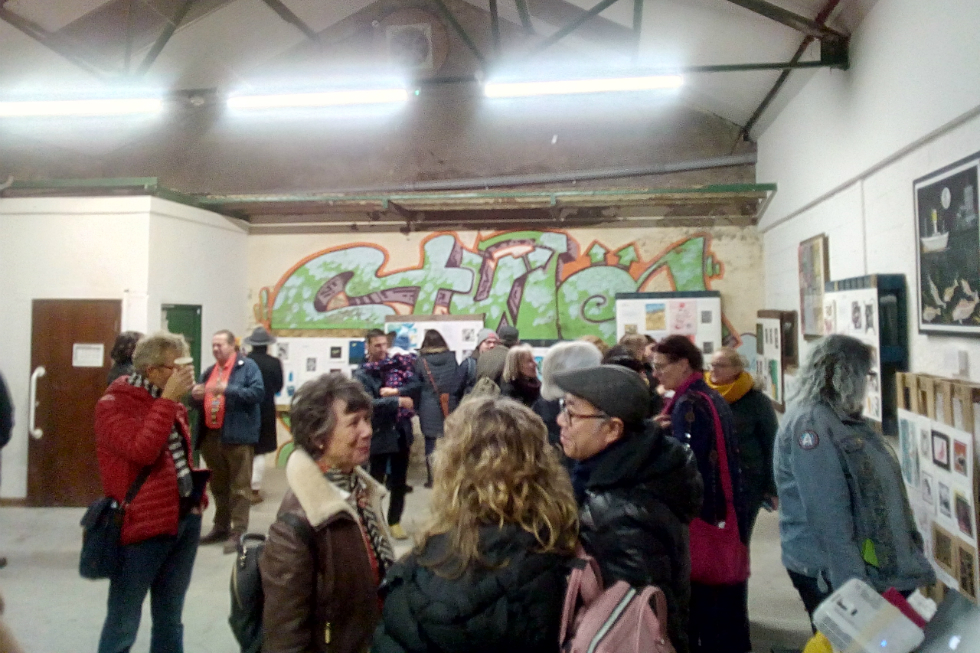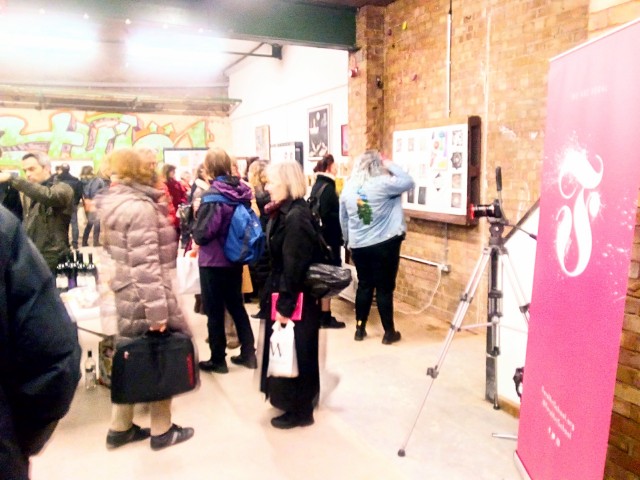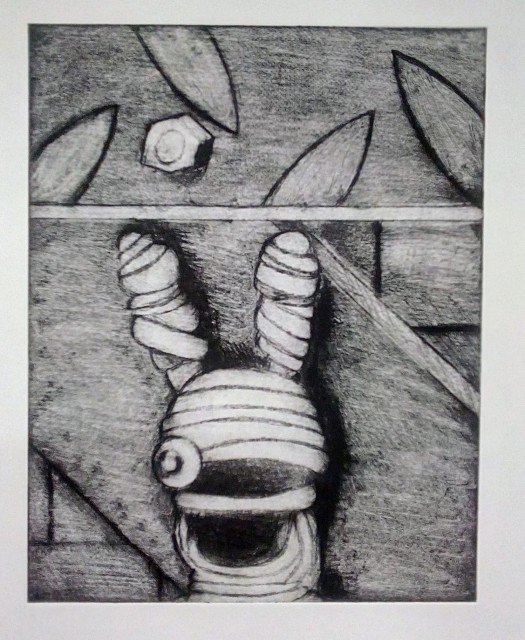“An exciting time to be an artist in Hull.” – When Art School goes Feral

As Hull’s provision for BA Hons Art & Design looked doomed, artist Paul Collinson outlines exciting new initiatives waiting in the wings…
This time last year I was writing about the sad demise of Hull’s historic School of Art & Design following Hull College Group’s mismanagement and poor performance leading to a request for Exceptional Financial Support and a subsequent massive publicly funded £54m Fresh Start bailout of its entire education offer in Harrogate, Goole and Hull. This exceptional economic support Hull College Group received did not stop it abandoning its QAA commended BA Hons Art & Design provision with 85% staff cuts to HSAD.
While this was going on, I was part of an innovative project that aims to bring a different way of teaching and accessibility to BA Hons Art & Design provision to Hull: this project is called Feral Art School (FAS). FAS’s main aim is to offer a more open access and democratic ethos to quality art and cultural education and experience through delivery of a new BA Hons Art & Design degree course in Hull. FAS was constituted as a Community Interest Company in June 2018 and is run according to cooperative principles of social justice and democratic control that align with the International Co-operative Alliance.
FAS’s origins can be traced back to conversations that took place in 2015 between Jackie Goodman, then Curriculum Manager at HSAD, and Professor Mike Neary on his research in pedagogy for HE co-operative education during, ironically, an HE Development Day at Hull College. Following these conversations and a subsequent workshop in co-operative HE models by Neary and Dr Joss Winn, both of Lincoln University, in June 2017, the then ongoing uncertainty within HSAD and Hull College Group’s apparent intentions towards HSAD led Goodman and fellow HSAD tutor Jayne Jones to reach out to other members of staff and Hull based professional artists to form a core group of seven members who would become Directors of the future FAS CIC.
Last July FAS received corn-seed funding from City of Culture Ltd. to run an initial Feral Foundation course. This was a four month part time course combining the teaching of practical skills in drawing, printmaking, painting, and critical dialogue. There were 12 students enrolled with a range of skills and experience drawn from the City of Culture volunteers: all had a hunger and desire to learn and experience the making of visual art and to be part of the FAS co-operative project. Importantly FAS had established working relationships with a number of local businesses and organisations as sites to deliver their project. Working with Wykeland Group within its Fruitmarket development in Hull allows short-term use of empty properties on Humber Street, and in November FAS coincided its public launch as a new organisation alongside the outcomes from the first cohort of Feral Foundation students.

FAS received Arts Council England funding to run a six month programme of advanced courses alongside further Feral Foundation courses. The latest Feral Foundation and the advanced short courses in drawing and print, painting, textiles, fashion, and community journalism are delivered in partner organisation sites such as an ex-education authority school building managed by Hull’s Goodwin Development Trust, at the Humber Street Gallery and Juice Studios on Humber Street. But, as stated above, the longer term goal is for an open access and economically viable BA Hons Art & Design degree course that involves the ‘student as producer’, one who can be involved in shaping the learning experience within an organisation run on the co-operative values and principles of social justice whereby the gaining of knowledge and transfer of skills is for community good and mutual benefit rather than private and corporate gain. This importantly will involve the ongoing training of FAS members and directors through UK COOP training courses for governance of a co-operative, personal and professional development for its directors and members, and effective working in such an organisation.
Whilst ‘alternative’ education is nothing new in the arts, and the fine arts are replete with historic and ongoing examples of alternative art schools, many are post-grad, that rely on the private financial support of the student, often leading to the view that they are more akin to finishing schools for middle and upper class aspiring artists. The limited access to arts education and career development is borne out in recent surveys on the social and economic demographics of those working in the arts, and would indicate continued inequalities and access to the arts from the less-well off and socially disadvantaged. As Hull is a city that doesn’t really have a middle or upper class the students FAS recruit should help shift this inequality for the future art workforce.
Recent government legislation intended to give state schools and colleges greater control and autonomy over their own governance and finances to create more competition between institutions and more choice for potential students, actually meant further corporatisation and marketization with a focus on gaining as much of the student fees available with less offer. Since the 2011 Education Act many state schools have taken the opportunity to run on the co-operative model, yet the HE sector had not then taken up that opportunity to challenge the business-driven model. In their paper Beyond Public and Private: A Framework for Co-operative Higher Education presented at the COOP HE conference of 2016, Neary and Winn cite other research as to possible reasons –“hazards” – as to why there has been no co-operative university so far, such as “governance failings of ownership, control, accountability and regulation” and “the private appropriation of public resources and the manipulation of university degree programmes to serve the interests of business”.
In March this year FAS Director Jackie Goodman attended the first COOP University information day and was co-opted onto the UK COOP College’s University interim academic board ahead of the newly established COOP University’s delivering and accrediting degrees. FAS is currently one of four UK organisations that are working with the UK COOP College to establish a federation of higher education co-operatives. FAS will be the first UK art school able to confer a BA Hons degree on students through the COOP University.

Since then the latest cohort of Feral Foundation and short course students have showcased their work on Humber Street in the Spring Feral Reveal. FAS has worked with Wykeland and the Juice Studio as a site for delivering textile, photography and fashion courses. As you read this FAS is awaiting the outcome of its Art & Design Degree course papers being accepted by UK COOP College University. So, all being well, FAS students will begin their four-year part-time BA Hons Art & Design degree course in January 2020 and will be paying considerably less in course fees.
This week (27 June), FAS is delivering a one day event of conversations on Humber Street – What artists want: What artists need. Discussed will be the future of HE fine art education in light of recent legislation and the continuing financial difficulties facing many colleges and universities, and whether this is an opportunity or threat. Various models of arts education, how artists can self-organise, and routes into arts education and training will be explored along with how attempts at providing ‘value for money’ and better routes into employment for potential art students may be still predicated on competition in and the marketization of the HE sector. Speakers include Jamie Sorensen, Kerry Harker, Paul Stewart, Äslaug Thorlacius and John Heffernan.
FAS and its students, members and directors adhere to the UK COOP values and principles, which works for the mutual benefit of all thus empower students, offering the opportunity for enhancing their skills to develop new ways of thinking, working, researching and learning for life and not just acquiring the necessary technical and critical skills and knowledge from an Art & Design degree. This is what makes this an exciting time to be an artist in Hull and for potential students with democratic governance and common ownership of fine art higher education, and, importantly, cultural democracy.
Paul Collinson is an artist who lives and works in Hull. He graduated from Hull School of Art & Design in 1991
Images, from top: main and body, FAS launch and Foundation reveal, 23/11/18; Bunny Mummy FAS Foundation student Kelley Lane





